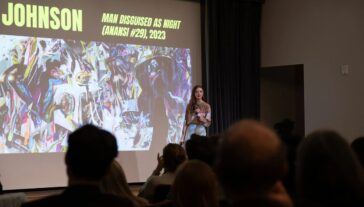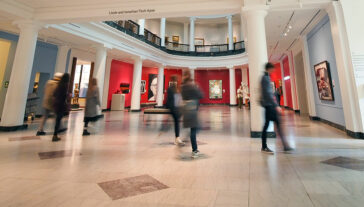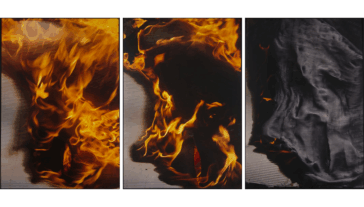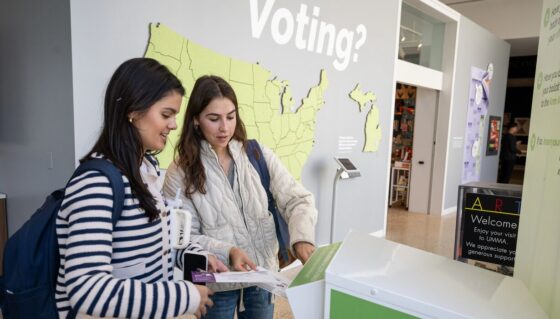UMMA Leads Coalition of Art Museums Across the Country in Unprecedented Civic Engagement Campaign Ahead of 2024 Election
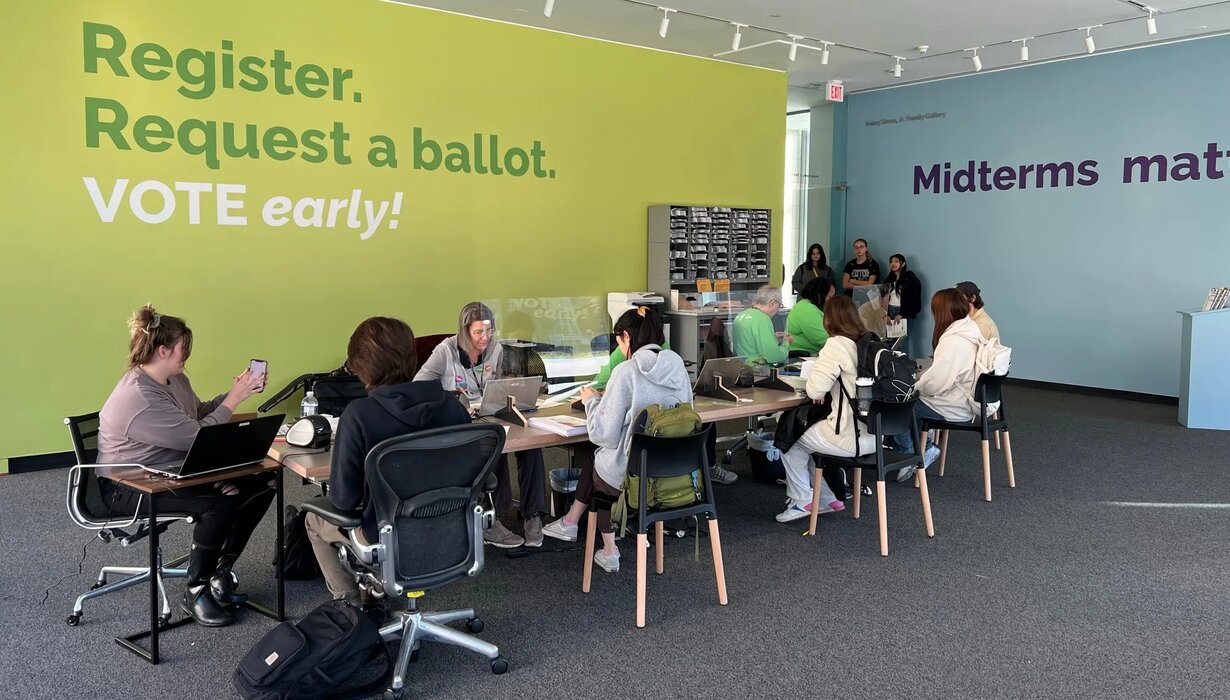
As reported recently in the New York Times, a coalition of 10 art museums, all on public university campuses, are set to play a crucial role in the 2024 U.S. presidential election season. Brought together by UMMA to share their collective work, these museums will present a series of non-partisan exhibitions and events across the country aimed at showcasing the power of art in fostering civic engagement.
Guided by the shared belief that art museums play an integral role in strengthening civil society, the collective plans support a more engaged citizenry, provide places for people to come together collectively, learn to disagree, and build empathy across differences.
In addition to UMMA, the coalition consists of art museums on college campuses including those at Michigan State University, Penn State University, UCLA, University of Illinois Urbana-Champaign, University of Iowa, University of Nebraska, University of Oregon, and University of Wisconsin-Madison. Many of the museums are in areas of the country often cited as “purple states,” where political divisions can be heightened.
Designed to unify disparate conversations around democracy and bridge political divides across their varied campuses, the coalition will host high-profile exhibitions, public programs, and collaborative initiatives each designed for their unique communities. Many of these programs have begun to roll out and will continue into the Fall 2024 election season.
“There is no better place for this kind of community building and civic participation than art museums,” said Christina Olsen, Director of UMMA. “Art brings people together and helps us understand and accept our differences in ways few other things can. This partnership with other art museums on college campuses makes it clear how essential the role we all play in our communities can be.”
These collective efforts aim to make a meaningful and tangible difference in: countering political polarization; exploring democratic values through art; creating educational opportunities for the public audiences they serve; demystifying the voting process for young and first-time voters; and driving awareness and action through engagement in civic life.
UMMA will also organize plans to release an “Election Dialogue Deck”, a deck of cards featuring works of art from all 10 collections, which includes guidance and prompts for hosting conversation exercises for political reflection. Physical versions of the decks of cards will be available at all campuses, and a digital version will be made available this fall.
“Artists have long confronted the thorniest and most difficult issues of their times, and works of art do incredible work in nurturing complex conversations,” said Jon Seydl, Director of the Krannert Museum at UI Urbana-Champaign. “It makes good sense to draw on our collections and exhibitions to think together about our current moment. Our coalition also provides a laboratory in which each of our museums can learn from one another and our communities.”
Additional details about each museum’s plans are shared below (in alphabetical order):
Michigan State University (Eli and Edythe Broad Art Museum)—The Eli and Edythe Broad Art Museum will partner with The Judith Center, a new non-profit organization founded by artist Kathryn Andrews that brings together women artists, activists, and thought leaders to spur conversation. Together the MSU Broad Art Museum and the Judith Center will commission artists to create posters that deal with the issue of misogyny and sexism in the U.S. and the lack of representation and involvement of women in politics. The initial five commissioned posters will be displayed at the museum, just steps away from the Michigan state capitol in Lansing, starting in spring 2024, leading up to and through the fall election cycle.
The Pennsylvania State University (Palmer Museum of Art) — will feature the rich diversity of art being produced by native, transplanted, and adopted Pennsylvanians in the present moment that speak to the politics of race and representation, activism and social justice, while Politics and Daily Life, will present a range of politically inflected imagery from the permanent collection to catalyze conversations around empowerment, injustice, propaganda, patriotism, and protest. In addition, the Palmer will host a series of student engagement programs, including a “Fight for Your Rights pARTy” and “The Art of the Vote,” where Penn State students can register to vote and reflect on the power of art to communicate, question, and inspire change.
Rutgers University (Zimmerli Art Museum) —In fall 2024, the Zimmerli Art Museum will continue its collaboration with the Eagleton Institute’s Center for Youth Political Participation, a non-partisan effort to register, mobilize, and engage Rutgers University students to participate in politics and vote in local, state and national elections. The effort, known as RU Voting, will organize volunteers to conduct voter registration campaigns at museum events, including Zimmerli’s monthly art party, SparkNight. RU Voting Interns are leading the ongoing efforts that began in January 2024. In addition, the Zimmerli will open Smoke and Mirrors, an exhibition that disrupts normative ideas about accessibility in public spaces by showcasing fifteen artists with disabilities, organized by guest curator Dr. Amanda Cachia (University of Houston), a leading scholar in disability studies and activism.
UCLA (Hammer Museum) — The Hammer Museum has been a voting center and polling location for several election cycles; that will continue during the 2024 presidential election. The museum will host a variety of democracy and civic engagement-related programming this year, including a Super Tuesday Viewing Party, a documentary film series about elections, and an event related to the U.S. Constitution.
University of Illinois Urbana-Champaign (Krannert Art Museum)—The Krannert Art Museum will open a collaborative installation interrogating ideas of democracy, social justice, and social movements. The installation will feature works selected by the Krannert community, including local high school students. It will be installed on the Museum’s entrance wall during the fall 2024 semester. In addition, the museum will host an arts advocacy event – in tandem with a state organization – to provide training for advocacy for the regional arts communities of Champaign-Urbana.
University of Iowa (Stanley Museum of Art) —The Stanley Museum of Art will open To My Friends at Horn: Keith Haring and Iowa City on May 4, 2024. Keith Haring envisioned a world where art functioned as a pillar of education and civic life, and this was particularly evident in his dedication to working with children. By revisiting the artist’s two trips to Iowa City, where he painted a mural at an elementary school in 1989, this exhibition considers the artist’s commitment to freedom of expression as foundational for a democracy to flourish. Also on view is Generations, an installation of the permanent collection that focuses on displacement, immigration, and transnational circulation, questions of equity and sovereignty, and ecological crisis.
University of Michigan (UMMA) —After hosting successful voting initiatives in 2020 and 2022, UMMA is expanding its commitment to civic responsibility and demystifying the voting process. In collaboration with the Creative Campus Voting Project (CCVP) led by Stephanie Rowden and Hannah Smotrich, UMMA will transform one of its galleries into a fully functional City Clerk’s office to allow registration, absentee ballot requests, and early voting for Ann Arbor voters. CCVP will design the space with artful elements to make voting accessible and anxiety-free. In addition, artist Philippa Pham Hughes will curate an exhibition involving works from the Museum’s collection arranged on a commissioned mural installed directly on the gallery wall. Hughes’ installation will be an interactive experience and include relational events, discussions, and lectures aimed at engaging the “exhausted majority” to counter political polarization.
University of Nebraska (Sheldon Museum of Art) — The Sheldon Museum of Art exhibition (In)credible: Exploring Trust and Misperceptions encourages visitors to consider how we sort through the vast amount of available information to determine what is, or is not, trustworthy. During the fall 2024 semester, a second iteration of the installation will build upon the first, directly tying media literacy to voter rights and election fairness. Sheldon is also working with Husker Vote Coalition, a nonpartisan University of Nebraska-Lincoln committee run out of UNL’s Student Leadership, Involvement, and Community Engagement Office, to host voter registration tables where people can register to vote, check their voter registration status, sign up to vote by mail for elections in Nebraska or out of state, and learn more about voting.<
University of Oregon (Jordan Schnitzer Museum of Art) —The museum’s major fall exhibition, Necroarchivos de las Americas – An Unrelenting Search for Justice, explores art from across Latin America that confronts political violence, whether created by the state or by political and private actors operating outside the bounds of the established order. In works that range widely in artistic method and aesthetic strategy, Necroarchivos (“death files”) poses the question of what price societies pay when the rule of law breaks down, or when the state actively takes arms against its own citizens. Artists represented include Doris Salcedo, Rafael Lozano-Hemmer, Teresa Margolles, Voluspa Jarpa, Luis Camnitzer, and others.
University of Wisconsin-Madison (Chazen Museum of Art) — The Chazen Museum of Art has served as a polling place for the City of Madison since 2020, which will continue with the 2024 election cycle. The museum opens early on election day and turns over its spacious lobby to poll workers and citizens of the precinct.
Art brings people together and helps us understand and accept our differences in ways few other things can. This partnership with other art museums on college campuses makes it clear how essential the role we all play in our communities can be.
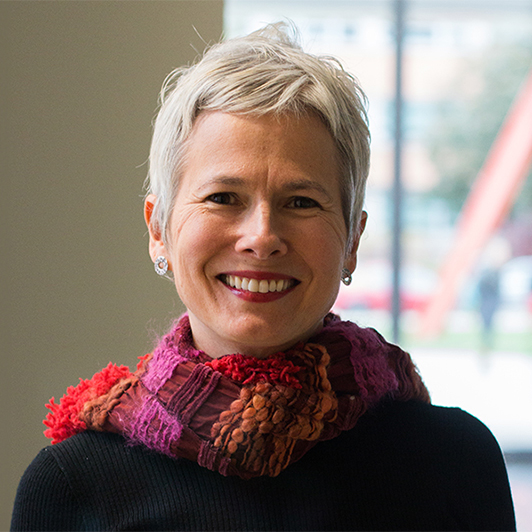
More from UMMA
